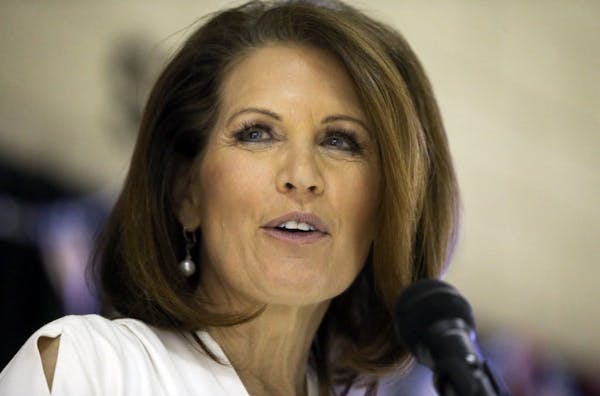WASHINGTON – When former U.S. Sen. Norm Coleman heard about his party killing off the GOP Iowa straw poll, originally scheduled for August, he compared the entire event to a dunk tank invitation he received during one of his old St. Paul mayoral races.
Coleman, now a Washington lobbyist helping Sen. Lindsey Graham's presidential campaign, found the request to be humiliating.
"I said 'No, I am not doing a dunk tank,' " he recalled. "This [the Iowa straw poll] to me is that at the presidential level. Some things are not worth doing. It doesn't matter how big the crowd is."
Last month, Iowa Republican organizers abruptly canceled the long-standing straw poll after failing to generate enough promises of attendance from the more than a dozen GOP presidential hopefuls.
Many GOP operatives have joked that former U.S. Rep. Michele Bachmann, R-Minn., the last candidate to win the straw poll, doomed it to obsolescence. After her 2011 victory in Ames, Iowa, Bachmann placed a disappointing sixth in the 2012 Iowa caucuses and immediately dropped out of the presidential race.
"I have absolutely no doubt Minnesota played a big role in the demise of the Iowa straw poll." Coleman said, clearly tongue in cheek. "Minnesota has once again poured dirt on a rival."
Jokes aside, the death of the Iowa straw poll — also known as the Ames Straw Poll — is just another sign that the national political landscape is in the throes of massive change.
Next year's presidential race is already shaping into a different event than the races of earlier years. Politicians are stressing bigger events, less retail politics and a finely tuned social media strategy. Rather than early, winding bus tours, voters can expect to see direct messages. Candidates are more apt to skip the backyard barbecue and hire a twenty-something social media team to engage voters directly on Facebook and Snapchat.
"If you're a voter in Michigan or Florida or whatever, you can either start to watch it now or ignore it now," said Mike McKenna, a veteran GOP strategist and adviser to several Republican presidential candidates. "The digital media has really changed the way we consume news and campaigns are not immune to that. It's a more complicated world. It was a lot easier when campaigns just drove around on a bus."
In other words, a Republican voter in Florida is not necessarily going to have to wait to see what a bunch of activists in Iowa or New Hampshire think because odds are, campaigns are already working to target him.
Former Minnesota Gov. Tim Pawlenty, also a GOP presidential hopeful in 2012, said the death of the straw poll was a "good riddance."
Four years ago, Pawlenty's campaign spent a lot of money in Iowa. After Bachmann beat him out in the straw poll, he abruptly quit the race. He now says he should have banked his resources and developed a multistate strategy.
Putting everything on Iowa, he said, is like trying to catch "lightning in a bottle."
"I think what everyone has figured out is, you have to have enough money for three or four or five or six states if you're going to be credible," said Pawlenty, now CEO of the Financial Services Roundtable in Washington. "Some of the traditional structures are getting disrupted and power is being redistributed … to people who can raise or donate lots of money because that allows you to buy the capability to communicate directly to voters."
Democratic presidential hopeful Hillary Rodham Clinton's campaign is already using that approach.
The former secretary of state has given few media interviews, but her effort has engaged in "grass-roots" drives in all 50 states, including Minnesota. She talks to voters via YouTube and Twitter.
Her campaign said there are "575 active volunteers" ready to work in Minnesota.
The campaign has held eight congressional launch parties in the state — one per district — and five organizational meetings, officials said. But when Clinton was in the Twin Cities recently for a private fundraiser, she declined media interviews and held no public meetings.
To be sure, the early primary states — Iowa, New Hampshire, South Carolina and Nevada — still matter.
McKenna said in some ways, the current dynamic shows voters a truer candidate.
"I'm in favor of all this as a citizen," he said. "I think it's impossible to run a campaign without a candidate's true beliefs and personality coming through. The media is everywhere now."
Allison Sherry • 202-383-6120
